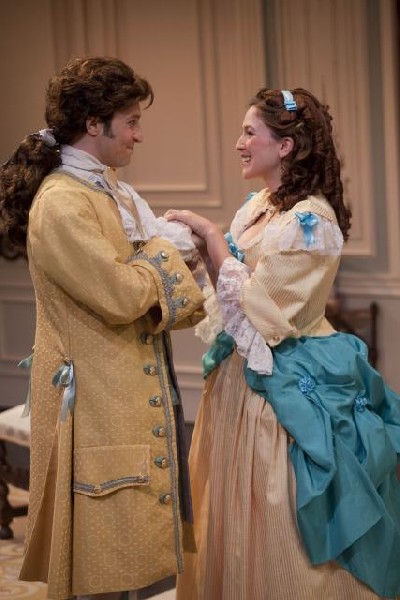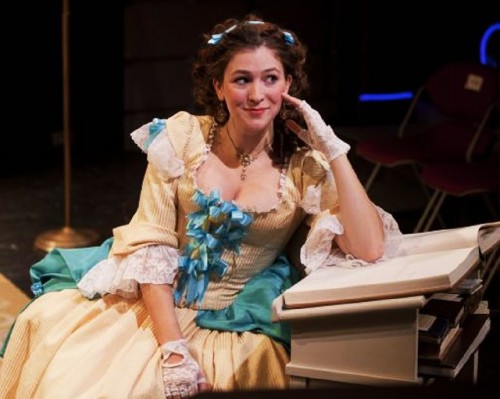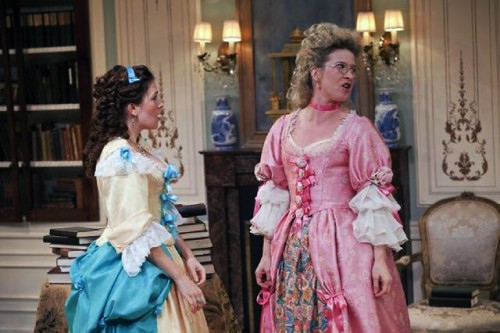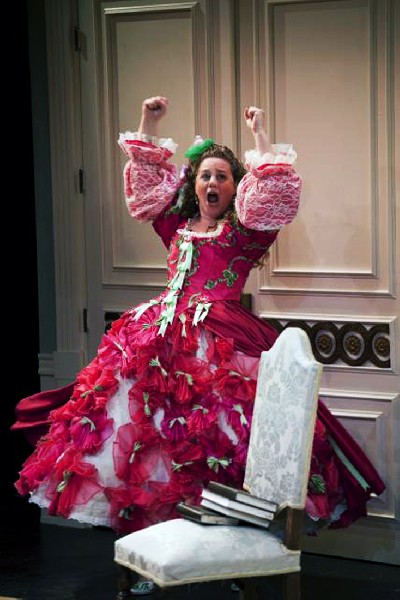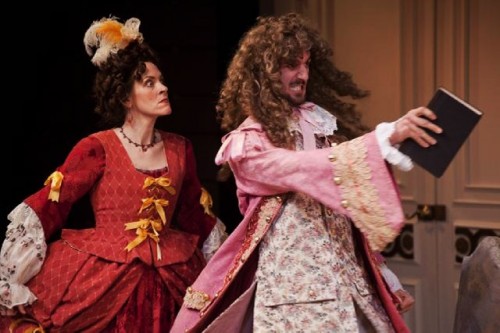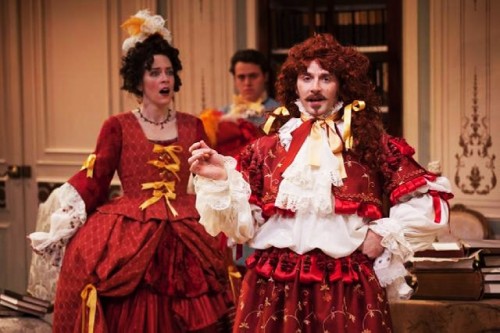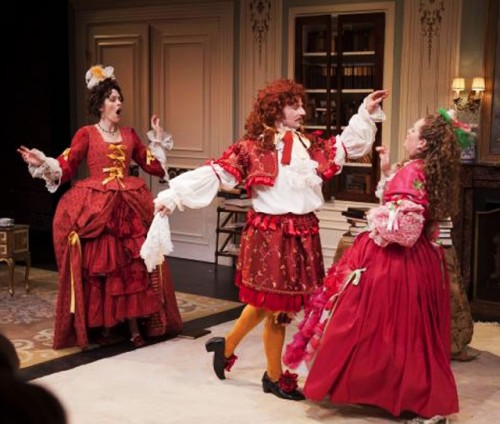Moliere’s Learned Ladies at Shakespeare & Company
Hilarious Production Through March 25
By: Charles Giuliano - Feb 13, 2012
The Learned Ladies
By Moliere (Jean-Baptiste Poquelin)
The Learned Ladies premiered on March 11, 1672 at the Théâtre du Palais-Royal in Paris.
Translation by Richard Wilbur
Director: Tina Packer
Assistant Director: Jenna Ware
Cast: Jules Findlay, Kelly Galvin, Dana Harrison, Stephanie Hedges, Jennie M. Jadow, Daniel Joeck, Alexandra Lincoln, Brittany Morgan, Ehren Remal, Enrico Spada, Ryan Winkles
Set Designer: Patrick Brennan, Costume Designer: Govane Lohbauer, Wardrobe: Mary Readinger, Lighting Designer: Stephen D. Ball, Sound Designer: Michael Pfeiffer, Stage Manager: Kate Johnson
Elayne P. Bernstein Theatre
Shakespeare & Company
Lenox, Mass
Through March 25
Two servants struggled to carry a large wardrobe trunk on stage during the opening scene of Moliere’s The Learned Ladies at Shakespeare & Company. In a chaotic frenzy the actors appear and dig through the trunk for wigs, shoes, and items that are a part of their costumes. It is a moment of divine disarray and a signifier of the frenetic pace of this ever so witty and lively production vamped up to scorching comic intensity by the directing team of Tina Packer and her assistant Jenna Ware.
The end of act one evokes similar mayhem that freezes into a tableau vivant. When the lights (designed by Stephen D. Ball) come up at the beginning of the second act we find the actors again posed like statues. The freeze frame unlocks and the action commences.
Brilliant.
The verse text of Moliere is nicely translated and set to poetic meter by Richard Wilbur. But that first scene puts us on notice that Packer and Ware will take liberties in giving us a thoroughly modern Moliere with a nicely ersatz rococo set (designed by Patrick Brennan) and gorgeously droll, pastel shaded period costumes. Indeed, if costumes could speak, the over the top designs by Govane Lohbauer would have some of the best lines of an immensely enjoyable evening.
Just to look at some of the ridiculously outfitted characters evokes gales of laughter. The costumes provide visual signifiers for the most absurdly outrageous characters.
Consider the contrast between the suitors. The more romantic and compelling underdog Clitandre (Enrico Spada) is elegantly but sensibly dressed. His wig with pony tail and ribbon seems later than the period of the play. The pedant and opportunist Trissotin (Ryan Winkles) is attired like an extravagant courtier of the ilk depicted by Watteau or Hyacinth Rigaud. His red wig is a mass of curls accenting the pink ribbons that mark the hem of a skirt like tunic over tights. There are oceans of lace wafting from the cuffs of his sleeves.
Trissotin has a perennial stance, arms extended in a half bow, with a large handkerchief used to brush the air in sweeping gestures. This coupled with a constant smirk strikes one as a character from ballet, then in its infancy, or commedia del’arte.
While Clitandre strides about in a sober manner with comedic contrast Trissotin floats like a butterfly and stings like a bee. It would seem to be no contest between the rivals but love triumphs and the rather plodding but sincere Clitandre prevails.
Trissotin flits about with such buggery and frippery that we are shocked when he pursues the fair Henriette with such sanguine lust. It appears however, that like the J. Geils song, first he looks at the purse.
A seminal issue that the satirist Moliere touches on is the education of women. Another is who wears the coulottes in the family?
A woman was expected to be learned up to the limit of an acquaintance with the classics. The object was to converse intelligently with men and be an asset when entertaining the guests of her husband. By no means was it acceptable that a woman be a scholar. This is the conceit of Philamite (Dana Harrison) who has raised Armande (Alexandra Lincoln) who emulates her passion for the classics and the more sensible and feminine Henriette (Kelly Galvin) who does not.
Other skills expected of a proper young lady were to dance, play a musical instrument and sing, sew, write poetry, and when married to manage servants and a household. Raising children, at least before they can converse, is not her responsibility or interest. An elegant woman was noted for her salon.
In her dedication to a life of the mind Armande has callously rejected the romantic overtures of Clitandre. But she is adamant about not handing him over to the more willing Henriette. While Clitandre did truly love Armande he received nothing but scorn and rejection for the effort. This enforces his resolve to wed the more accepting and sensual Henriette.
The parents of the girls, however, have different plans for their daughters.
Daniel Joeck is absurdly divine as the hen pecked and subservient father Chrysale. Just to look at this Silly Billy is to burst out laughing. Joeck is a tall, gaunt, bearded, gangly strip of a man. His twisting, supple verticality is exaggerated by a dangling wig with long ringlets. It seems in the manner of Louis Quatorze. His supple facial gestures and comic exaggerations make him a man of a thousand masks.
Chrysale embraces Clitandre and endorses his potential engagement. As the man of the house he pronounces it a done deal not needing to consult his wife. She, of course, sees a better match with the pedant Trissotin.
Philaminte is a perfectly villainous shrew. Unfortunately, Dana Harrison was out of voice and never seemed fully to inhabit the pivotal role. Gamely, she appeared to be fighting a nasty cold.
Overall, Packer and Ware have created a well meshed ensemble of players. But the actors are not evenly matched. While all of the performances are superb some of the players are so stridently over the top that they tip the balance.
As Belise Jennie M. Jadow is so comically gonzo that she steals every scene she appears in. Measured by audience reactions, and spontaneous bursts of applause, she is the ersatz star of the show. This is neatly emphasized by an insanely zany costume, a riot of Valentine reds and bon bons. Comic frenzies of passionate, but unreciprocated love have her crashing into and chewing on the scenery.
The brilliant and outrageous Winkles and Joeck match her over the top intensity. When all three are on stage together sparks fly. They are the rising tide that raise the other boats.
Brittany Morgan has milked a minor role as a maid Martine. She has been fired by the wicked Philaminte. But Chrysale strives to protect her and hire her back. Morgan, in an out of sync, rural American accent delivers the most compelling speech of the evening. She urges Chrysale to wear the pants in the family and put women in their proper place.
Martine is the 17th century equivalent of Tammy Wynette’s anthem “Stand by Your Man.”
Not that any of this makes sense. It doesn’t have to. Learned Ladies sent us catapulting out of the theatre with a jolly smile on a cold winter night. It was as warm and heart warming as a roaring hearth on a frosty night.
Kudos to Shakespeare & Company for presenting one of the most thoroughly satisfying, and entertaining comedies of the year during the dead of a Berkshire winter. What a hoot.

